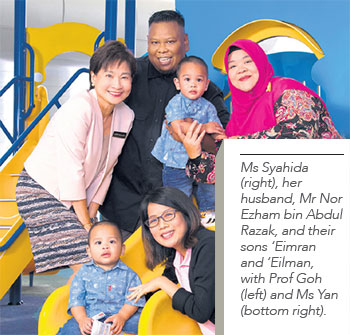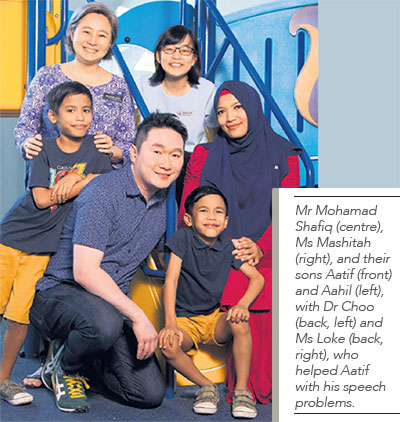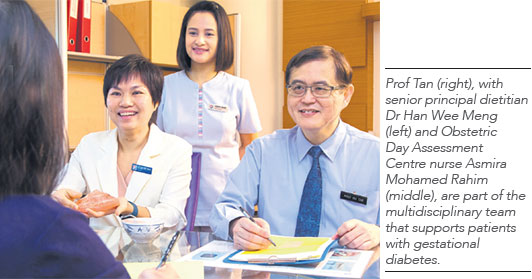KKH establishes innovative care programmes that empower the community beyond the hospital. These strengthen community support for families, and optimise health for patients because every woman and child is precious.
A household name, KKH is one of the leading tertiary referral centres for women’s and children’s health.
More than just a well-regarded institution, KKH establishes innovative care programmes that empower the community beyond the hospital. These strengthen community support for families, and optimise health for patients — because every woman and child is precious.
 Holistic support for mothers and babies
Holistic support for mothers and babies
Since October 2014, KKH has led the Temasek Foundation Cares KIDS 0-3 Programme, partnering with AMKFSC Community Services with support from Temasek Foundation Cares.
So far, nearly 150 children have been enrolled under the programme.
This home visitation programme aims to give opportunities for children from vulnerable families to develop their full potential.
From July 2016, the programme has received support from the Early Childhood Development Agency under the KidSTART pilot, and 150 more children are expected to benefit from this funding.
“By supporting the mother from pregnancy until the child is three years old, we are able to enhance the healthy adjustment of the family and optimise healthy growth and development for the child,” says programme lead, Associate Professor Winnie Goh, senior consultant at KKH.
The programme provides integrated health and social support for mother and baby and develops close partnerships with community partners.
They include government and health agencies, child development and preschool centres, voluntary welfare organisations and family service centres.
Ms Syahida Abdull Samad, 31, joined the programme on recommendation from her medical social worker, Ms Valerie Goh.
From the fourth day after her son’s birth, Ms Syahida began to receive weekly home visits from a nurse.
After the eighth week, Ms Syahida began to receive visits from Ms Yan Zhen Ying, a community health visitor.
 Guided by Ms Yan, Ms Syahida learned how to handle baby tantrums and to help her sons develop.
Guided by Ms Yan, Ms Syahida learned how to handle baby tantrums and to help her sons develop.
Her younger son, Nor ‘Eimran Rifqi, was able to walk and pronounce short phrases by one year of age.
Going to the craft and playgroup classes at the KIDS 0-3 Centre also helped her two-yearold, Nor ‘Eilman Muqri, conquer his stranger anxiety at school.
Supporting children with developmental needs
Singapore’s community-based early detection and intervention programme for pre-schoolers with mild developmental needs — Mission I’mPossible — was born in July 2009, through a partnership with Lien Foundation and PAP Community Foundation.
“Over three years, Mission I’mPossible screened over 1,700 pre-school children, and provided family-focused learning support and therapy services to more than 300 at-risk pre-schoolers, to improve their readiness for mainstream education,” says Associate Professor Mary Daniel, head and senior consultant at KKH’s Department of Child Development.
The successful pilot was adopted by the Ministry of Social and Family Development, and has been expanded into Development Support (DS) & Learning Support (LS) programmes, currently running in many pre-schools in Singapore.
Mr Mohamed Shafiq Mohamed Zin and his wife Ms Mashitah Ibrahim were initially at a loss when their youngest son, Aatif, was screened and diagnosed with speech and language difficulties at the age of five.
As young parents, Mr Mohamed and Ms Mashitah had found it very challenging to engage Aatif.
Then the family met Dr Sylvia Choo, and speech therapist Amanda Loke, who encouraged and taught them creative therapies for Aatif that could also be carried out at home.
“Working with Aatif’s parents to enhance his communication and learning has been an enriching experience for Amanda and I, as we witness their dedication and hard work, and resilience as a family,” says Dr Choo.
Now eight years old, Aatif undergoes periodic follow ups with Dr Choo. Together with Aatif’s family, the team continues to identify new ways to engage Aatif, and help him develop his full potential.
Building community psychosocial
health and resilience
“Children and adolescents are very vulnerable to
developing psychological and emotional difficulties
following a traumatic event.
“Left unaddressed, the impact of trauma raises
a child’s risk of developing behavioural problems,
among other potential emotional and psychological
issues,” says clinical psychologist Ms Lim Xin Yi, who
heads KKH’s Psychosocial Trauma Support Service.
In April 2014, KKH launched the Temasek Foundation
Cares Kids in Tough Situations (KITS) programme with
community partners and Ministry Of Education —
making trauma-focused therapy more accessible to
children and youth affected by traumatic events.
Under the programme, community and school-based
therapists were trained to provide trauma-focused
cognitive-behavioural therapy to these children in need.
The Stay Prepared Trauma Network for Children
programme followed in July 2016. Its aim is to enhance
psychosocial capabilities and resources upstream in
Singapore’s community through preventative and
resiliency programmes.
Nipping gestational diabetes in the bud
 Singapore has one of the highest incidences of gestational diabetes mellitus (GDM) in the world, and recent KKH studies show that about 15 to 20 per cent of pregnant women in Singapore have GDM, which increases their risk of developing birth complications.
Singapore has one of the highest incidences of gestational diabetes mellitus (GDM) in the world, and recent KKH studies show that about 15 to 20 per cent of pregnant women in Singapore have GDM, which increases their risk of developing birth complications.
In line with the nation’s war against diabetes, KKH has launched the Temasek Foundation Cares GDM Care programme to detect and provide care for women with GDM.
Assisted by Temasek Foundation Cares (TFC), the programme aims to benefit about 5,400 women with GDM and their families over a three-year period by providing routine screening and educational support to all expectant mothers in KKH.
Those with GDM will be provided a care plan to best manage the condition for mother and child.
Says Professor Tan Kok Hian, head and senior consultant, Perinatal Audit and Epidemiology Unit, Department of Maternal Fetal Medicine at KKH: “Children born from pregnancies affected by GDM are at higher risk of developing obesity and Type 2 diabetes later in life.
“Through early detection, timely intervention and close follow-up care through this structured care and education programme, we are closer to optimising prevention and management of diabetes and associated health risks for our future generations.”
Last June, Singapore’s Integrated Platform for Research in Advancing Metabolic Health Outcomes in Women and Children (IPRAMHO) was set up to conduct research towards lowering the risk of metabolic health issues such as GDM in future generations.
“Our goal is to revolutionise the way medical professionals and health systems engage with patients at risk, allowing us to develop evidence-based, effective, affordable and scalable interventions,” says Prof Tan.

